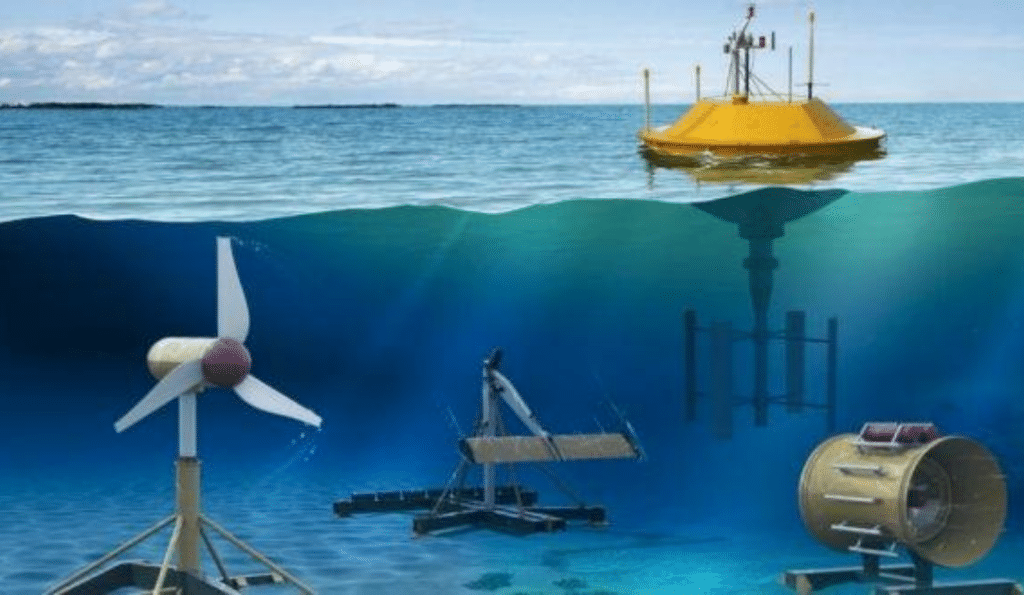India, with its extensive 7,500 km coastline, is making a significant leap toward harnessing ocean wave energy as a clean and sustainable power source. As the world moves towards renewable energy solutions, the country is tapping into its vast marine resources to reduce dependence on fossil fuels and mitigate climate change impacts.
With rising electricity demand and increasing concerns over carbon emissions, exploring alternative energy sources has become crucial. Wave energy, a largely untapped renewable resource, presents an opportunity to generate electricity continuously, as ocean waves never cease to move.
How Wave Energy Works
Wave energy is generated by the movement of ocean waves, which contain kinetic and potential energy. Specialized technologies, such as oscillating water columns, point absorbers, and attenuators, convert this energy into electricity. These systems use floating or submerged devices that rise and fall with the waves, driving turbines or hydraulic pumps to generate power.
Unlike solar and wind energy, which depend on sunlight and wind speed, wave energy is more consistent, making it a reliable renewable energy source. It also has a smaller land footprint compared to solar farms and wind turbines, making it an attractive option for densely populated coastal regions.
India’s Breakthrough in Wave Energy Development
India has been exploring wave energy for several decades, but recent technological advancements have accelerated progress in this field. Leading research institutions and government agencies are working on innovative projects to harness the power of the ocean.
One of the most significant developments is the deployment of wave energy converters along the Indian coastline. These devices are designed to endure harsh marine conditions while efficiently capturing wave energy. Recent pilot projects have successfully demonstrated the feasibility of wave power generation, proving that India has the potential to integrate this renewable source into its energy mix.
Key Projects and Research Initiatives
India’s efforts in wave energy development have been spearheaded by top engineering institutions and government-backed agencies. Some notable projects include:
- Wave Energy Pilot Plants: Researchers have deployed small-scale wave energy converters offshore to test their efficiency and durability. These prototypes generate electricity by harnessing the oscillatory motion of waves.
- Innovative Turbine Technology: Engineers are developing advanced turbines that can operate efficiently in fluctuating wave conditions, maximizing energy output.
- Coastal Research Facilities: Dedicated research centers are studying the behavior of Indian Ocean waves to design customized energy solutions for different coastal regions.
These initiatives aim to refine wave energy technologies and make them commercially viable on a large scale.
Challenges and the Road Ahead
Despite its immense potential, wave energy faces several challenges that must be addressed before large-scale adoption:
- High Initial Costs: Developing and deploying wave energy infrastructure requires significant investment. While costs are expected to decrease with technological advancements, initial funding remains a barrier.
- Durability and Maintenance: Wave energy converters must withstand corrosive seawater and extreme weather conditions, making maintenance a crucial factor in long-term viability.
- Environmental Concerns: The impact of wave energy projects on marine ecosystems is still being studied. Researchers are working to ensure that energy extraction does not harm marine life or disrupt coastal biodiversity.
- Grid Integration: Efficiently integrating wave energy into India’s existing power grid requires further development of storage solutions and transmission networks.
India’s Vision for a Sustainable Future
The Indian government is actively promoting research and development in wave energy through policy support and funding. By investing in marine renewable energy, India aims to diversify its energy portfolio and reduce its carbon footprint.
If successfully implemented, wave energy could play a crucial role in meeting India’s growing electricity demand while minimizing environmental impact. With continued innovation and strategic investments, the country is poised to become a global leader in ocean-based renewable energy solutions.

